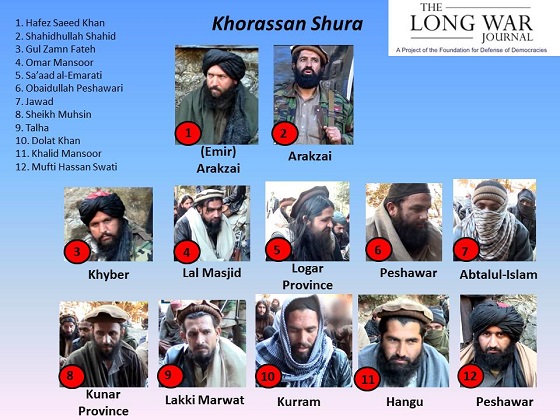Abu Muhammad al Adnani, a spokesman for the Islamic State, announced the group’s “expansion” into the lands of “Khorasan” — modern day Afghanistan, Pakistan and parts of the surrounding countries — and declared former Movement of the Taliban in Pakistan (Tehrik-e Taliban Pakistan or TTP) commander Hafez Saeed Khan as the “governor” of Khorasan province. Khan had previously served as the Movement of the Taliban in Pakistan’s emir for the tribal agency of Arakzai.
Adnani made his announcement in a nearly seven minute audio taped speech titled, “Say, Die in Your Rage!” which was published on Jan. 26 2015 by the Islamic State’s Al Furqan media outlet. [For a translation of the speech, by Pieter Van Ostaeyen, see ‘Audio Statement by IS Spokesman Abu Muhammad al-‘Adnani as-Shami.’]
The declaration comes only a few weeks after a conglomeration of former TTP officials formed the Khorasan Shura and pledged bayat, or allegiance, to the Islamic State. [See Long War Journal report, Pakistani Taliban splinter group again pledges allegiance to Islamic State.]
The Islamic State spokesman acknowledged Khan’s pledge of allegiance to Abu Bakr al Baghdadi as Commander of the Faithful and the Caliph of Muslims, and claimed that Baghdadi had accepted the pledge and appointed Khan as the province’s governor and Mullah Abdul Rauf Khadim as the deputy governor. Khadim, a former Guantanamo detainee and former senior Taliban commander in southern Afghanistan, has reportedly been operating in Helmand province on behalf of the Islamic State. [See Long War Journal report, Ex-Gitmo detainee leads contingent of Islamic State fighters in Afghanistan.]
Adnani further urged the “mujahideen in Khorasan” to come forth and obey the commands of Khan and Khadim. Notably, Adnani also urged caution in his call to arms, noting that “the factions will assemble against you and the rifles and bayonets fixed against you will multiply.” He encouraged the mujahideen to stand firm against “factionalism and disunity” and to meet these challenges by “unsheathing your swords and spears.” Although not clearly stated, Adnani was issuing a veiled threat to the Taliban factions, both Afghan and Pakistani, that opposed the creation of the Khorasan Shura and who were opposed to the Islamic State.
The Afghan Taliban movement has been consistent in avoiding recognizing the Islamic State and its Caliph Abu Bakr al Baghdadi since the reclusive leader of the Afghan Taliban, Mullah Mohammad Omar, has previously held the title of Commander of the Faithful position since 1996.
Adnani’s declaration and Baghdadi’s reported approval for the Islamic State to expand into Afghanistan and Pakistan could incite divisions within the various Taliban factions operating in both countries. The cohesion of many Taliban factions has been compromised over the past few years, mostly due to attrition and leadership decapitations, as well as ideological differences and personal feuds.









1 Comment
very cool